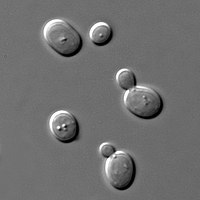
Photo from wikipedia
Abstract Brettanomyces (Dekkera) bruxellensis is an ascomycetous yeast of major importance in the food, beverage and biofuel industry. It has been isolated from various man‐made ecological niches that are typically… Click to show full abstract
Abstract Brettanomyces (Dekkera) bruxellensis is an ascomycetous yeast of major importance in the food, beverage and biofuel industry. It has been isolated from various man‐made ecological niches that are typically characterized by harsh environmental conditions such as wine, beer, soft drink, etc. Recent comparative genomics studies revealed an immense intraspecific diversity, but it is still unclear whether this genetic diversity also leads to systematic differences in fermentation performance and (off‐)flavor production, and to what extent strains have evolved to match their ecological niche. Here, we present an evaluation of the fermentation properties of eight genetically diverse B. bruxellensis strains originating from beer, wine and soft drinks. We show that sugar consumption and aroma production during fermentation are determined by both the yeast strain and composition of the medium. Furthermore, our results indicate a strong niche adaptation of B. bruxellensis, most clearly for wine strains. For example, only strains originally isolated from wine were able to thrive well and produce the typical Brettanomyces‐related phenolic off‐flavors 4‐ethylguaiacol and 4‐ethylphenol when inoculated in red wine. Sulfite tolerance was found as a key factor explaining the observed differences in fermentation performance and off‐flavor production. Sequence analysis of genes related to phenolic off‐flavor production, however, revealed only marginal differences between the isolates tested, especially at the amino acid level. Altogether, our study provides novel insights in the Brettanomyces metabolism of flavor production, and is highly relevant for both the wine and beer industry.
Journal Title: FEMS Yeast Research
Year Published: 2017
Link to full text (if available)
Share on Social Media: Sign Up to like & get
recommendations!